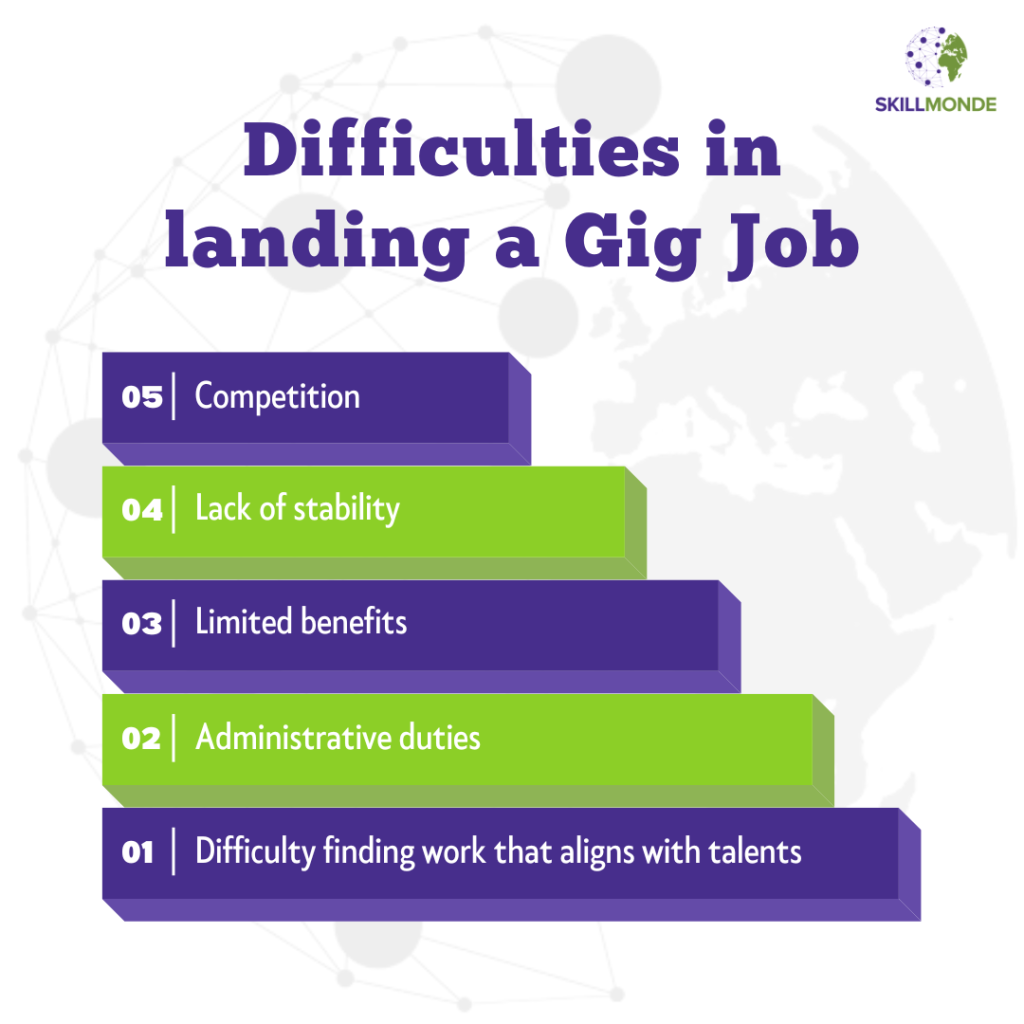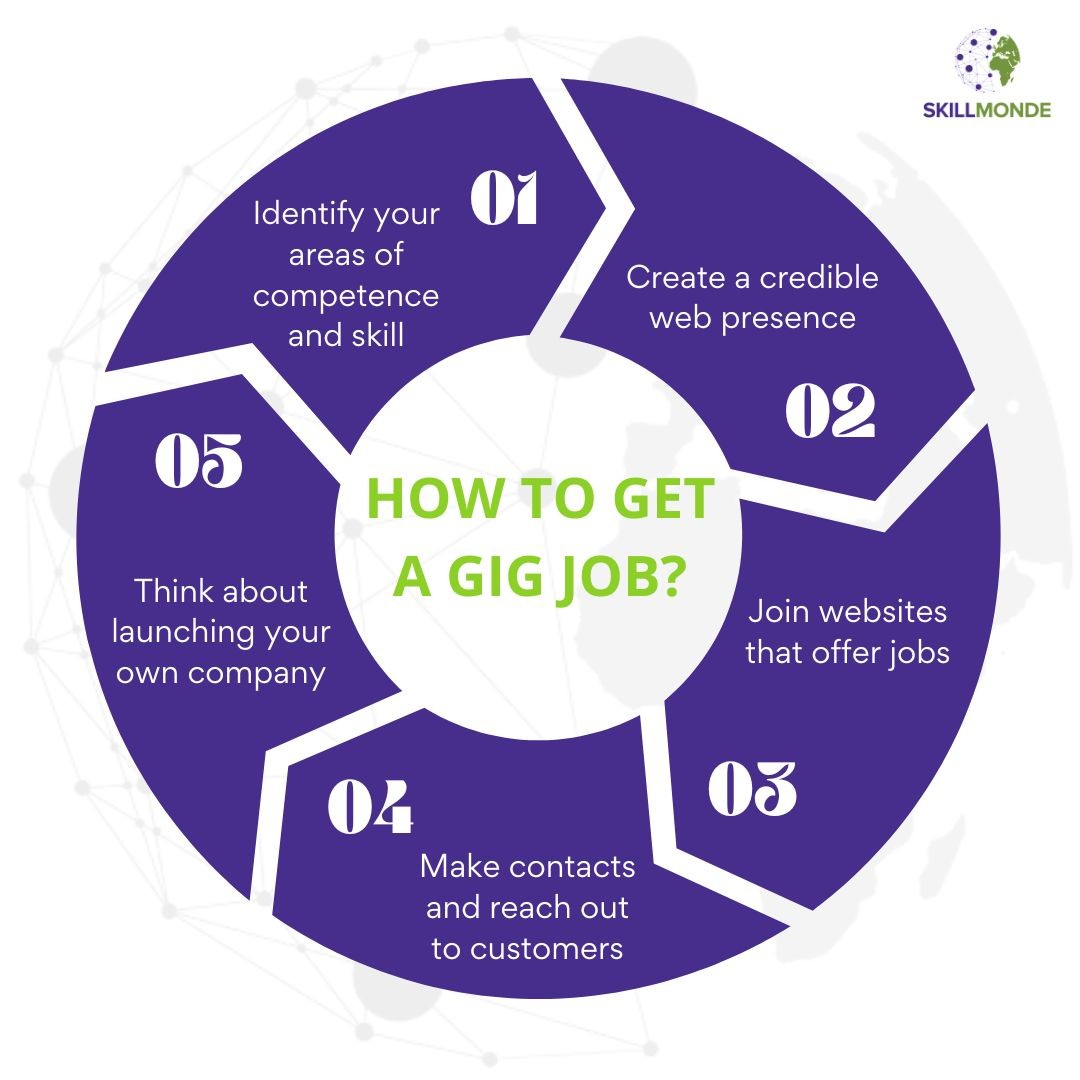Instead of the standard long-term employment structure, gig job is defined by short-term or project-based engagements. A wide number of sectors and professions, including artistic ones like writing, design, and photography, as well as more technical ones like programming and engineering, can be covered by gig employment.
Gig jobs are frequently discovered through web resources or through networking with possible employers. Gig workers are sometimes seen as self-employed individuals who are in charge of their own taxes and perks.
Finding gig jobs, also known as contract or freelance work, is possible in a variety of ways. A few of them are:
1. Identify your areas of competence and skill-
Accomplishment to land in your favorite gig work depends upon the industries you are interested in. This will assist you in narrowing down your employment search and personalising your application materials.
2. Create a credible web presence-
Due to the fact that a lot of gig jobs are found through social communities, it is essential to have a professional web presence and resume. Examples of this include a LinkedIn page, a personal website, or a showcase of your expertise on an official site like Behance or GitHub.
3. Join websites that offer jobs-
Numerous online job platforms link independent contractors with businesses searching for temporary or project-based work. Upwork, Freelancer, and Fiverr are a few well-liked alternatives. A new entry in the market, SkillMonde is another such job platform for freelancers.
4. Make contacts and reach out to prospective customers-
Networking can be a useful tactic when seeking a freelance job, especially in specialised sectors. Attend industry events, sign up for professional associations, and get in touch with potential clients directly to inquire about freelancing work.
5. Think about launching your own company-
Consider launching your own business and marketing your services as a freelancer or contractor if you have a certain ability or area of interest. Take charge of your work and determine your own fees, however, getting started takes a lot of time and work.
Difficulties in landing a gig job:

Despite the benefits and flexibility in gig jobs, there are hurdles and challenges in this field also. They are:
- Competition: Getting a gig job is challenging. Because, many eligible applicants may be vying for the same freelance gigs.
- Lack of stability: Because gig employment is frequently temporary or project-based, there is frequently little consistency and predictability in terms of pay and workload. Planning ahead and handling money can be challenging as a result.
- Limited benefits: Gig workers are sometimes regarded as independent contractors. That is why, they are not eligible for the same insurance policies, retirement plans, and paid time off as regular employees.
- Difficulty finding work that aligns with talents and interests: Finding gig employment that aligns with an individual's skills and interests can be difficult, especially in highly specialized professions.
- Administrative duties: Gig workers could have to spend a lot of time on administrative duties, which can be time-consuming and may not be paid. Examples of such duties include invoicing and tracking expenses.
In general, gig labour has the potential to be a flexible and rewarding way to earn a living, but it does have its own unique set of difficulties. Gig workers need to be proactive about obtaining employment, managing their finances, and being aware of any potential negative aspects of this line of work.
FAQs on how to get a gig job
1. How can I locate gig jobs?
- You can find gig jobs by browsing online job boards, utilising platforms for the gig economy like Upwork or TaskRabbit, or by applying to work for a particular gig-based business (e.g. Uber, Lyft).
2. What credentials are required for a gig job?
- Gig gigs have different requirements depending on the sort of work. For instance, you might require a portfolio of work to demonstrate your abilities if you want to work as a freelance writer or designer.
3. Do I need to be an expert in a particular field to work a gig job?
- The answer is no, you don't have to be an expert to work a gig. However being knowledgeable or skilled in a certain field can help you find employment.
4. How much money can I make at odd jobs?
- Depending on the sort of work, location, and demand, earnings from gig jobs might vary greatly. Instead than paying an hourly wage, many gig jobs pay based on the quantity of work or tasks done.
5. Are there any drawbacks to doing a gig?
- Lack of employment security or benefits and the potential for irregular or unpredictable income are a few potential drawbacks of gig work.
6. How do I begin working a gig?
- Your interest in the kind of employment decides the opportunities to come your way when you start working a gig. Find businesses or platforms that employ gig workers and adhere to their application requirements. Be ready to present any required credentials or paperwork, such as body of work.
